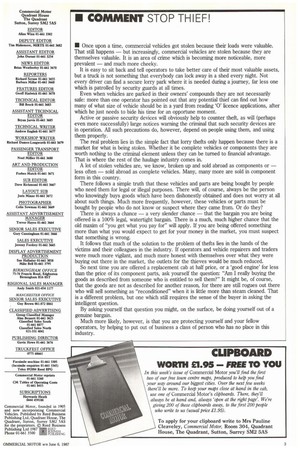• COMMENT STOP THIEF!
Page 5

If you've noticed an error in this article please click here to report it so we can fix it.
• Once upon a time, commercial vehicles got stolen because their loads were valuable. That still happens — but increasingly, commercial vehicles are stolen because they are themselves valuable. It is an area of crime which is becoming more noticeable, more prevalent — and much more cheeky.
It is easy to sit back and tell operators to take better care of their most valuable assets, but a truck is not something that everybody can lock away in a shed every night. Not every driver can find a secure lorry park where it is needed during a journey, far less one which is patrolled by security guards at all times.
Even when vehicles are parked in their owners' compounds they are not necessarily safe: more than one operator has pointed out that any potential thief can find out how many of what size of vehicle should be in a yard from reading '0' licence applications, after which he just needs to bide his time for an opportune moment.
Active or passive security devices will obviously help to counter theft, as will (perhaps even more successfully) large notices warning the criminal that such security devices are in operation. All such precautions do, however, depend on people using them, and using them properly.
The real problem lies in the simple fact that lorry thefts only happen because there is a market for what is being stolen. Whether it be complete vehicles or components they are worth nothing to the criminal element unless they can be turned to financial advantage. That is where the rest of the haulage industry comes in.
A lot of stolen vehicles are, we know, broken up and sold abroad as components or — less often — sold abroad as complete vehicles. Many, many more are sold in component form in this country.
There follows a simple truth that these vehicles and parts are being bought by people who need them for legal or illegal purposes. There will, of course, always be the person who knowingly buys goods which have been dishonestly obtained and does not worry at all about such things. Much more frequently, however, these vehicles or parts must be bought by people who do not know or suspect where they came from. Or do they?
There is always a chance — a very slender chance — that the bargain you are being offered is a 100% legal, watertight bargain. There is a much, much higher chance that the old maxim of "you get what you pay for" will apply. If you are being offered something more than what you would expect to get for your money in the market, you must suspect that something is wrong.
It follows that much of the solution to the problem of thefts lies in the hands of the victims and their colleagues in the industry. If operators and vehicle repairers and traders were much more vigilant, and much more honest with themselves over what they were buying out there in the market, the outlets for the thieves would be much reduced.
So next time you are offered a replacement cab at half price, or a 'good engine' for less than the price of its component parts, ask yourself the question: "Am I really buying the goods as described from someone who is entitled to sell them?" It might be, of course, that the goods are not as described for another reason, for there are still rogues out there who will sell something as "reconditioned" when it is little more than steam cleaned. That is a different problem, but one which still requires the sense of the buyer in asking the intelligent question.
By asking yourself that question you might, on the surface, be doing yourself out of a genuine bargain.
Much more likely, however, is that you are protecting yourself and your fellow operators, by helping to put out of business a class of person who has no place in this industry.




































































































